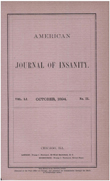Pituitary-adrenal-system regulation and psychopathology during amitriptyline treatment in elderly depressed patients and normal comparison subjects
Abstract
OBJECTIVE: This study was done to compare the effects of 6-week treatment with amitriptyline on hypothalamic-pituitary-adrenocortical (HPA) regulation in elderly depressed patients and age-matched comparison subjects. METHOD: A combined dexamethasone-suppression/CRH- stimulation (dexamethasone/CRH) test was administered before initiation of amitriptyline treatment and at the end of weeks 1, 3, and 6 of treatment. Thirty-nine depressed inpatients, mean age = 69 years, completed the study. Fourteen normal volunteers, mean age = 67 years, served as comparison subjects. RESULTS: In relation to the comparison subjects, the depressed patients had a profoundly abnormal HPA response, in particular an exaggerated cortisol release in the dexamethasone/CRH test. This abnormality began to disappear after 1 week of treatment with amitriptyline. In contrast, amitriptyline did not affect neuroendocrine regulation in the comparison subjects at any time during the test period. CONCLUSIONS: The data suggest that amitriptyline affects HPA regulation in hypercortisolemic depression only, and they raise the possibility that normalization of its feedback control is related to the antidepressive effect of amitriptyline.
Access content
To read the fulltext, please use one of the options below to sign in or purchase access.- Personal login
- Institutional Login
- Sign in via OpenAthens
- Register for access
-
Please login/register if you wish to pair your device and check access availability.
Not a subscriber?
PsychiatryOnline subscription options offer access to the DSM-5 library, books, journals, CME, and patient resources. This all-in-one virtual library provides psychiatrists and mental health professionals with key resources for diagnosis, treatment, research, and professional development.
Need more help? PsychiatryOnline Customer Service may be reached by emailing [email protected] or by calling 800-368-5777 (in the U.S.) or 703-907-7322 (outside the U.S.).



